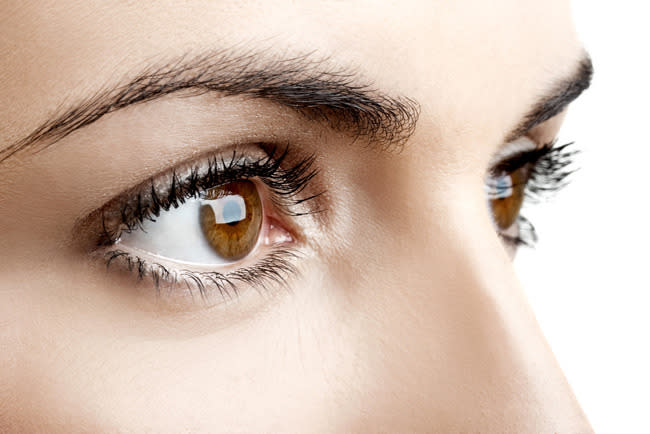Why Are There Floaters in Your Eyes—and Should You Be Worried?

Find out if it’s worth seeing a doctor. (Photo by Shutterstock)
There is nothing—and we mean nothing—more annoying than those floaty little spots that sometimes cloud our vision. Talk about distraction. But aside from being a pain in the butt, those floating flecks typically aren’t anything to worry about.
“Most floaters are small condensations of gel floating around inside the eye, similar to a holiday snow globe being shaken,” says Michael Ehrlich, M.D., assistant professor of ophthalmology at Yale School of Medicine.
RELATED: The Craziest Sh*t People Have Gotten Stuck in Their Eyes
These condensations are caused when the vitreous (tranluscent, glass-like) gel found in your eyes (and also your joints) shrinks and changes consistency—kind of like the way Jell-O can liquefy and shrink in a container. This is especially common in women, says Ehrlich.
Floaters can sometimes be a clue to infection, inflammation, or even diabetes, but these cases are much less common. If you notice a big increase in the number of floaters you see, if you start seeing flashing lights, or if you notice a shadow in your vision, it’s time to head to the eye doctor.

“As the gel in the eye shrinks, it can in rare cases pull off a small piece of the back lining of the eye called the retina,” says Ehrlich. Since the retina is what allows us to see, this retinal detachment can be a major visual emergency.
RELATED: Would You Have Laser Surgery to Change Your Eye Color?
Once your eyes have been checked for underlying causes, you’ll most likely just have to deal with the floaties for a while. But there’s cool biology news here: Over time, your brain will compensate for the obstruction in your vision.
“I reassure patients that their brains will learn to ignore the floaters in the same way you don’t notice the frames of your glasses in your vision,” says Ehrlich. “But this process can take a few months and can be quite annoying.”
The bottom line: In most cases, floaters are nothing to worry about. And although it can take a quite a while for your brain to get used to them, be happy to know that there is a light at the end of the tunnel.
More from Women’s Health:
Why Some People’s Sneezes Smell Like Vomit
Why Some People Are More Prone to UTIs Than Others

